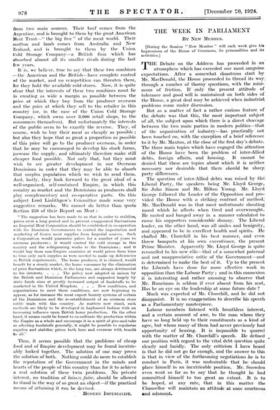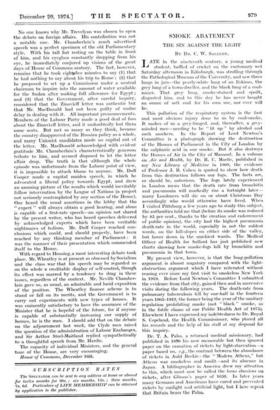[Durin g the Session "New Member" will each week give his
impressions of the House of Commons, its personalities and its activities.] THE Debate on the Address has proceeded in an atmosphere which has exceeded our most sanguine expectations. After a somewhat disastrous start by Mr. MacDonald, the House proceeded to thread its way through a number of thorny questions, with the mini- mum of friction. If only the present attitude of tolerance and good will is maintained on both sides of the House, a great deal may be achieved when industrial, problems come under discussion. But as a matter of fact a rather curious feature of the debate was that this, the most important subject of all, the subject upon which there is a direct cleavage between the two main parties in modern politics—that of the organization of industry—has practically not been touched on, with the exception of a brief reference to it by Mr. Maxton, at the close of the first day's debate. The three main topics which have engaged the attention of the House have been the problem of inter-Allied debts, foreign affairs, and housing. It cannot be denied that these are topics about which it is neither, necessary nor desirable that there should be sharp: party differences.
The question of inter-Allied debts was raised by the: Liberal Party, the speakers being Mr. Lloyd George, Sir John Simon and Mr. Hilton Young. Mr. Lloyd George followed the Leader of the Opposition and pro- vided the House with a striking contrast of method.,' Mr. MacDonald was in that most unfortunate shouting mood which he affects when tired and overwrought. He ranted and banged away in a manner calculated to cause his supporters considerable dismay. The Liberal leader, on the other hand, was all smiles and benignity, and appeared to be in excellent health and spirits. He chaffed Mr. Churchill in his best manner, and even threw bouquets at his own executioner, the present Prime Minister. Apparently Mr. Lloyd George is quite reconciled to his new role—that of a somewhat paternal and not unappreciative critic of the Government—and is determined to make the best of it. Up to the present the Liberals have done far more effective work in opposition than the Labour Party ; and in this connexion it is interesting and rather amusing to observe that Mr. Runciman is seldom if ever absent from his seat, Has he an eye on the leadership at some future date ?
Much was expected of Mr. Churchill, and he did not disappoint. It is no exaggeration to describe his speech as a Parliamentary masterpiece.
Labour members listened with breathless interest, and a certain amount of awe, to the man whom they have so long held up to their constituents as a kind of ogre, but whom many of them had never previously had opportunity, of hearing. It is impossible to quarrel with the matter of Mr. Churchill's speech. Ile defined our position with regard to the vital debt question quite clearly and lucidly. The only criticism 1 have heard is that he did. not go far enough, and the answer to this is that in view of the forthcoming negotiations _he is to conduct in Paris, it was undesirable that he should place himself in an inextricable position. Mr. Snowden even went so far as to say that he thought he had committed himself to too great an extent. It is to be hoped, at any rate, that in this matter the Chancellor will maintain an attitude at once courteous and adamant. No one knows why Mr. Trevelyan was chosen to open the debate on foreign affairs. His contribution was not a notable one. Mr. Chamberlain's much advertised speech was a perfect specimen of the old Parliamentary style. With his tall hat resting on the table in front of him, and his eyeglass constantly dropping from his • eye, he immediately conjured up visions of the great days of House of Commons oratory. The fact, however, remains that he took eightsfive minutes to say (1) that he had nothing to say about his trip to Rome ; (2) that he proposed to set up a Commission under a neutral chairman to inquire into the amount of water available • for the Sudan after making full allowance for Egypt ; and (3) that the Government, after careful inquiry, considered that the Zinovieff letter was authentic but that Mr. MacDonald had not been guilty of undue delay in dealing with it. All important pronouncements. Members of the Labour Party made a good deal of fuss about the Zinovieff letter, and it undoubtedly lost them some seats. But not so many as they think, because the country disapproved of the Russian policy as a whole, and many Unionist candidates made no capital out of the letter. Mr. MacDonald acknowledged with evident gratitude Mr. Chamberlain's characteristically generous tribute to him, and seemed disposed to let the letter affair drop. The truth is that -although the whole episode was unfortunate from the Labour point of view, it is impossible to attach blame to anyone. Mr. Duff Cooper made a capital maiden speech, in which he advocated a liberal policy towards Egypt, and drew an amusing picture of the results which would inevitably follow intervention by the League of Nations (a project not seriously contemplated by any section of the House). One heard the usual assertions in the lobby that the " expert " will always obtain a good hearing, and alone is capable of a first-rate speech—an opinion not shared by the present writer, who has heard speeches delivered by acknowledged experts which have been veritable nightmares of tedium. Mr. Duff Cooper reached con- clusions which could, and should properly, have been reached by any thinking member of Parliament : it was the manner of their presentation which commended itself to the House.
With regard to Housing, a most interesting debate took place. Mr. Wheatley is at present so obsessed by Socialism and the class war that his speech may be regarded as on the whole a creditable display of self-control, though its effect was marred by a tendency •to drag in these issues, regardless of the context. Mr. Neville Chamber- lain gave us, as usual, an admirable and lucid exposition of the position. The Wheatley finance scheme is to stand or fall on its merits, and the Government is to carry out experiments with new types of houses. It was eminently satisfactory to have the assurance of the Minister that he is hopeful of the future, for if anyone is capable of substantially increasing our supply of louses, he is the man. I should add that on the debate on the adjournment last week, the Clyde men raised the question of the administration of Labour Exchanges, and Sir Arthur Steel-Maitland replied sympathetically to a thoughtful speech from Mr. Hardie.
The capacity of individual Ministers, and the general tone of the House, are very encouraging.
House of Commons, December 16th.











































 Previous page
Previous page